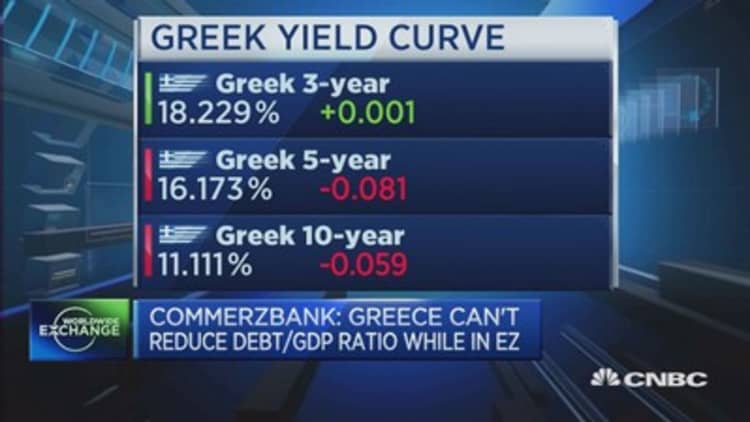There is a "high likelihood" of capital controls being introduced in Greece, according to a report published by Moody's on Wednesday, starting with a deposit freeze at Greek banks.
Moody's Investor Service downgraded its outlook for the Greek banking system to negative from stable, which it said reflected: "the significant deterioration in banks' funding and liquidity since December 2014, with deposit outflows estimated at more than 30 billion euros ($33.3 billion), or 18 percent of total deposits, over the past five months."
These pressures are unlikely to ease over the next 12-18 months, Moody's said, "and there is a high likelihood that capital controls and a deposit freeze will be imposed."
The credit ratings agency said the negative outlook also took into account the downward revision of Moody's 2015-16 GDP (gross domestic product) forecasts for the country, owing to political developments since the elections a few months ago which have led to a standstill in economic activity.
Read MoreHistory tells us how the Greek drama could end
Moody's now expects the country's economy to expand by just 0.5 percent this year – as does the European Commission, which earlier this month slashed its forecast from a previous estimate of 2.5 percent.
"The economic setback, coupled with Greek banks' higher funding costs and subdued revenue generation, will delay the recovery of pre-provision profitability in 2015, while banks will face rising problem loans and eroding capital buffers," Moody's said in the report.
"We expect dependence on central bank funding to remain high as depositor confidence remains compromised by ongoing uncertainty regarding Greece's support programme and related fears of potential capital controls and an exit from the euro area."
The report comes amid deep uncertainty over whether Greece can avoid bankruptcy and default. The country remains embroiled in reforms-for-aid talks with lenders, and a deal – that could release a vital 7.2 billion euros ($8 billion) worth of aid – seems some way off.
However, the country is rapidly running out of money and could struggle to pay both its domestic wages and pension bill next month, and debt repayments due to the International Monetary Fund (IMF), and European Central Bank (ECB) in June.
German investors spooked by Greece; sentiment tanks
European Union Economic Affairs Commissioner, Pierre Moscovici, said Wednesday that an agreement in the next few weeks was "do-able," but there were still big gaps on pension and labor market reforms, Reuters reported.

- By CNBC's Holly Ellyatt, follow her on Twitter @HollyEllyatt. Follow us on Twitter: @CNBCWorld


